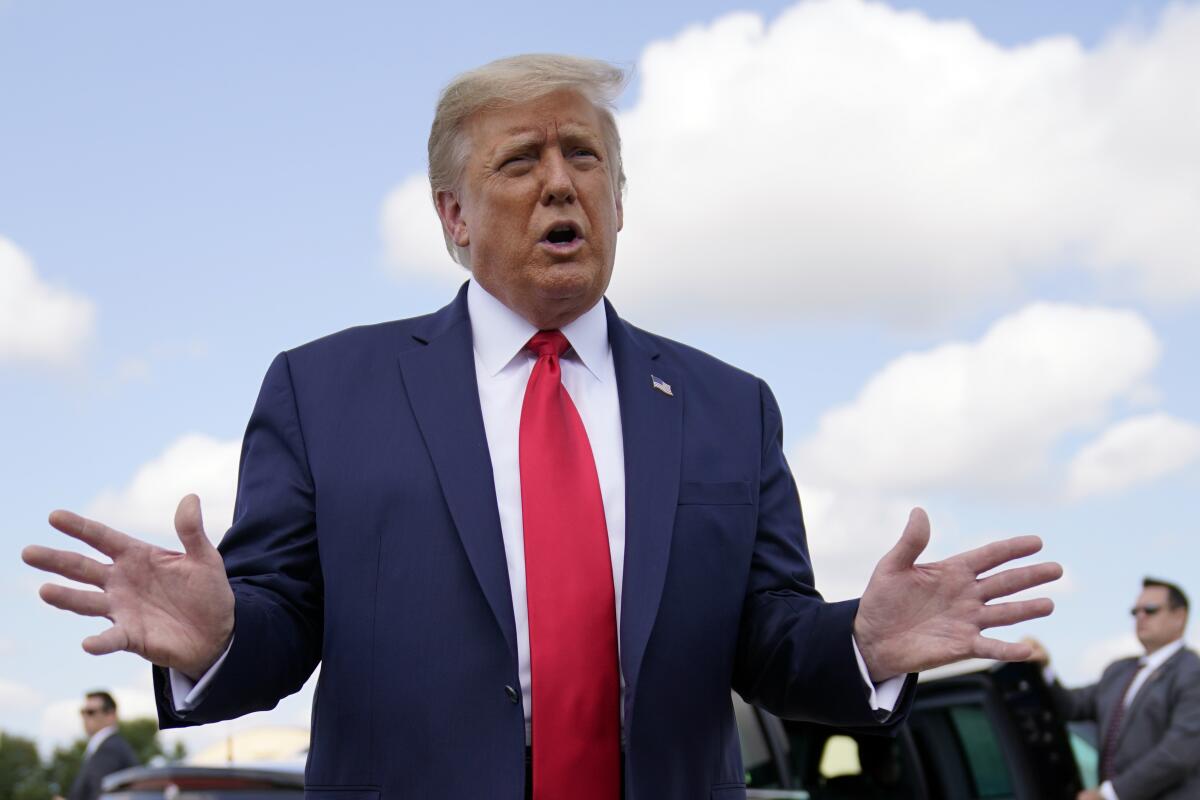White House directs agencies to relax enforcement

- Share via
WASHINGTON — A memo produced by the White House and sent to agency heads last week instructs them to make significant changes to how and when they bring enforcement cases, telling them not to open multiple investigations into the same company and urging them to seek political appointees’ approval before proceeding with an inquiry.
The new guidance, released Aug. 31, came from the Office of Information and Regulatory Affairs, or OIRA, a unit of the White House that does not typically get involved in enforcement policy.
Building off President Trump’s May executive order calling for agencies to do away with regulatory hurdles in order to boost the economy, the memo lists “best practices” for enforcing the nation’s laws and regulations. Critics of the administration said it could be used to entangle agencies, potentially stymieing investigations and giving the upper hand to companies suspected of wrongdoing.
John C. Cruden, a former Justice Department official in the Obama administration, called the memo “unprecedented.”
“At a time in our nation’s history when even-handed, statutory-based enforcement should be vigorously supported and encouraged, this policy goes in the opposite direction,” said Cruden, who served as assistant attorney general for the Justice Department’s Environment and Natural Resources Division. He added that the memo “provides an excuse for agencies to reduce or eliminate enforcement.”
Under Trump, enforcement has already slowed. The Environmental Protection Agency’s penalties for polluters are down, there are fewer inspectors working for the Occupational Safety and Health Administration, and financial penalties against corporations and banks accused of wrongdoing have declined.
Critics of the administration said that amid this concerted push to deregulate, the memo sends a message to agencies to pull back even more.
Amit Narang, a regulatory policy advocate at Public Citizen, a nonprofit consumer watchdog organization, said the memo could have ramifications for enforcement of regulations concerning the environment, public health and the financial markets. Narang and other government watchdogs said the memo could result in agencies easing up on investigations into polluters and workplace safety matters, curtailing surprise inspections and even placing time limits on investigations before they have started.
“This whole memo is an exercise in what industry would like regulatory enforcement to look like,” Narang said. “This is almost a wish list for industry.”
A spokesperson for the White House Office of Management and Budget, which oversees OIRA, said the document and the executive order on which it is based “protect both individuals and small businesses while at the same time enforcing the law against wrongdoers.”
The memo focuses on administrative cases, which make up the bulk of the federal government’s enforcement activity. These are usually smaller, less severe cases that can result in fines and orders requiring companies or individuals to take steps to prevent future violations.
Though there are already rules dictating the steps agency employees must follow in order to bring an enforcement action, the White House document suggests that the current system is not entirely fair to regulated industries.
It tells the agencies to apply “limiting principles” to the length of investigations, requiring their employees to file a complaint within a set time frame. Another part of the memo says agencies should exercise “discretion” in deciding whether to impose a penalty or drop a case against a party that attempted in good faith to follow the law.
If a statute is ambiguous, agencies should interpret it in favor of the company or individual that is subject to enforcement, the memo says, and officials should not open additional investigations into a single company or person if there is an ongoing one.
The memo also says that before an agency moves forward with an investigation or enforcement action, officials should get the approval of a political appointee — someone who was placed in office by the president.
“That’s just a terrible idea. That’s something that should be left to enforcement professionals,” said Eric Schaeffer, the executive director of Washington-based nonprofit Environmental Integrity Project who served as director of the EPA’s office of civil enforcement from 1997 to 2002.
Having to clear enforcement activity with a political appointee, Schaeffer said, “means every decision to enforce is a political one.”
More to Read
Get the L.A. Times Politics newsletter
Deeply reported insights into legislation, politics and policy from Sacramento, Washington and beyond. In your inbox twice per week.
You may occasionally receive promotional content from the Los Angeles Times.












